Travel Advice: How to Help a Toddler with Jet Lag
How to Help a Toddler with Jet Lag
After writing these tips for flying long-haul to Australia with a toddler, it seems only fair to say share what happened next, especially in terms of what happened when with our toddler with jet lag, after we ended up on the other side of the world, nine hours ahead of what our bodies thought it was, and with very little sleep had in the past 24 hours. In other words, we headed straight into Jet Lag territory, and we had a naturally very active 18-month-old toddler coming with us. Needless to say when we thought about toddler jet lag, we feared the worst!
We had ten days in Sydney to get into some kind of rhythm before then flying to Singapore and Thailand for another ten days and jumping into another time zone. I was expecting carnage and broken relationships and Googling "orphanages in Sydney" thanks to jet lag and exhaustion but much to my amazement, we managed to all be roughly in the right time zone - and have Baby Bird sleeping (mostly!) through til morning - by our fifth night in Sydney, and I'd say that only the first two nights were a "nightmare".
While this may sound like hell on earth, it actually really wasn't. We all managed to get roughly enough sleep to function during these days and we didn't have that many arguments (my partner and I) or meltdowns (my son... and partner and I). So I'd really like to share with you the things we did and didn't do to help our toddler with jet lag.
DISCLOSURE: This post contains affiliate links. I make a small commission off any purchases made but they don't cost you anything extra, and often I do a lot of research to find you the best possible deal in the link - yay!
OTHER FAMILY TRAVEL TIPS:
Tips for a Toddler with Jet Lag
Below you will find a variety of tips and advice for toddlers with jet lag to think about before and during your travel. Every toddler is different and if it helps, I wrote this about my toddler who at the time was sleep trained and at home would normally sleep from around 7:30pm - 6am, and he would have a 1-2 hour nap every afternoon. As a baby, he was very "sleep-adverse" (aka an absolute bloody nightmare!) and would regularly avoid as much sleep as he possibly could, but strangely he would generally (but certainly not always!) be fairly active and happy on it.
So these jet lag tips are for a toddler that naturally doesn't need much sleep! I know other kids and babies who have adjusted much quicker, and even some who didn't seem affected at all by huge time zone jumps, but they were generally children who were also quite "big sleepers" at home. Of course, nobody can predict how your young child will deal with jet lag but this is well worth keeping in mind!
So, read on to find out what we did that I think* helped our jet-lagged toddler. (*Who knows if it actually did, we haven't yet received Baby Bird's feedback form.)
Abandon the schedule
Needless to say, you're not going to be able to stay on the same schedule once you're in your new destination if it's more than a few hours behind or ahead of your usual time zone. While you may want to jump straight into the same schedule just in your new local timezone, it's my advice - and it was definitely my experience - that you abandon any kind of schedule until your little one is getting enough sleep at night so that they're set up to wake up and have the "normal" routine like they're used to at home. You're just setting yourself up for a fall if you expect a toddler with jet lag (in a foreign environment) to behave the same way they would at home.
Do not expect your little one to sleep when he/she "should"
Adults know when they should try and sleep or try and stay awake in order to adjust to a new time zone, even if our bodies are telling us a very different story. Children do not. Especially very young children who can't understand verbal explanations or communicate their confusion.
When they wake up feeling awake, they want to get up and play. When they feel tired at the "wrong" time of the day, they want to sleep. The worst thing you can do for yourself, your child and anyone within a 20 metre radius of your bedroom is try and force a jet-lagged toddler to sleep in the middle of the night when all they want to do is get up and play or eat or jump on your head.
The first few days will be crazy. Expect it. And let it be.
It's your job to try and adapt your little one's natural schedule into one that suits your new time zone and travel destination. For us that was keeping Baby Bird awake as long as possible after we arrived on our first night in Sydney so that he would have a large "sleep debt". In the end we put him to bed at around 9.30pm because after minimal sleep on the flights he was simply exhausted.
Unfortunately at 12.30 he was wide awake and wanting to party, so part of me feels like we should have tried to keep him awake longer. However, I'm also inclined to think he would have woken up regardless. After a quiet hour of just hanging out in bed with us it was clear he wasn't going to go back to sleep so my partner did his hero-bit and got up with him. They hung out, ate a (sugar-free!!) snack and played until 4.30am and then Baby Bird was rubbing his eyes a bit so we put him back to bed after a bottle of milk. Much to our surprise he slept again from around 5.30 until 10am, and much to our relief so did we!
We then put him to bed for a nap when he was looking tired that afternoon, which was around 3pm, and I then woke him up just before 5pm, which he was NOT happy about, but after a few episodes of Peppa Pig and some cuddles he was happy to be up and chasing the family dog around in just his nappy. I then took him to the park so he could run around in the fading heat. He was then showing signs of being tired around 8pm and he was in bed again by 9pm. Again he woke up in the middle of the night, but this time it was around 2am and he only stayed awake for a few hours rather than four.
The following day he was more aligned with his usual schedule at home and by the fourth and fifth day he was pretty much back on exactly the same timings. While he still woke up most nights we were able to get him to go back down with either a bottle, a cuddle or some paracetamol. To be honest, this may have just been teething rather than jet lag - who knows!? All I know is that he adapted much quicker to jet lag than I expected.
Get outside!
The reason kids and anyone feels jet lag is because of melatonin telling your body to sleep or when to be awake. You can't give a little toddler melatonin in tablet form - And yes, I did Google it, judge me! - but you can give your little one lots of exposure to daylight, which helps your melatonin levels readjust as the sunlight sends messages to your brain about when it's daytime... or not. So that's what we did with Baby Bird. We took him to the park or for a walk as much as possible every morning and in the afternoon, and we also made sure that his room was dark at night.
Create a sleep debt
I'm fairly sure one of the reasons Baby Bird adapted fairly quickly to the time zone change was because he was so tired after the journey. He really slept nowhere near enough during the two flights and he was exhausted by the time we arrived in Sydney. I also kept his naps limited to two hours as it's unusual for him to sleep longer than this at home and I didn't want to risk eating into his "sleep debt" for nighttime sleep.
Who knows for certain if this helped, because there's a strong argument that an overtired baby wakes up too early or in the night - and this is one theory Baby Bird has proven MANY times - but for us, making sure he had a four or five hour gap in between his nap and going to bed definitely helped in getting him to go to sleep at night.... at least for a short chunk of time!
This did, however, mean we had to avoid car journeys in the afternoon and evening as he would sleep in the car seat - yes, this was annoying, but not as annoying as a baby waking up at 3am and wanting to party on down.
Don't do too much in those first few days
With hindsight I can see that the main reason jet lag didn't get the better of us all is because we were able to focus a lot of attention to helping our toddler with jet lag in the first few days. This was because we stayed in one location (staying with family in their Sydney home) and we didn't have any big plans or important events during the day or evenings. We basically created an itinerary that suited us all and was easy to manage, i.e. no late nights, not too many social engagements and lots of kid-friendly activities. We also made sure we were close to home for naps and bed time so that when he did show signs of being tired we could put him to bed straight away., likewise we weren't in a hotel room all together so it did mean when one of us was sleeping or our son was, they could have complete peace and quiet.
I know not everyone will have this luxury as you may have limited travel time and indeed you may have to travel every few days but if this is the case I think you can expect your toddler's jet lag will be a bit harder to overcome - but it will pass once he natural circadian clock adapts. Just keep this in mind when you are planning your trip, and also remember you will be tired too so make it easy on yourselves!
Divide and conquer
I was lucky that my partner was happy(ish!) to get up with Baby Bird those first few nights when he was wide awake for hours. While I also stayed wide awake most of the time they were in another room playing because jet lag does not discriminate between adults and children, I did at least have quiet time to rest, read and try to go back to sleep.
This helped me then be on relatively good form the rest of the following day, and my partner could then take a long nap in the afternoon. This was preferable to him because he also had to stay up late working some days (as he runs his own business so rarely can take big chunks of time off) while I found myself really tired in the evenings, and I also find it very hard to sleep at night after I've had a nap. A few times I had to wake him up after his nap had gone on three hours or more, but if I can deal with a grumpy jet-lagged 18-month-old, I can definitely deal with a grumpy jet-lagged 34-year-old, no problem.
The best thing to do to try and beat those jet lagged middle of the night awake times, if you're lucky enough to be travelling with another adult, is to play to your strengths and come up with an agreed way to share the load. And when it is your turn to sleep do everything you can to make sure you get some whether it's taking melatonin (see below), locking the door to the bedroom, wearing an eye mask, and popping in some ear plugs, just do it!
Limit sugar and inactivity
Every baby and toddler is different, but we know that with our little one if we keep him fairly active, or entertained or simply if we keep him company, he is less likely to show signs of being sleepy and indeed he will "power through" any tiredness he may feel.
At home this is often a nightmare, but while away and in a different time zone this definitely played to our advantage. That said, Baby Bird gets huge rushes of energy just before bed which are then ginormous in size should he have even sniffed a millogram or two of sugar.
So we just tried to keep any kind of sugar out of his way in the afternoon (even fruit!) and ignored the fact that that meant Vegemite on toast for two out of three meals a day... groan. We also encouraged lots of running around and active playtime in between his naps and bedtime so he was physically tired when it came to bedtime.
Forget all the rules
If your kid's grumpy because he didn't want to get up from a nap, and an iPad is the only way to distract him... iPad it up.
If he insists on watching the same episode of Pingu again and again and again, then "Noot! Noot!!!" Bring on that plasticine penguin! If he won't eat anything else but watermelon, yoghurt, and toast and Vegemite for the first week of your trip, so what?
That's a few food groups covered.
In other words: You're tired. Your kid is tired. Your partner is tired. Pick your battles and do whatever you can to keep things nice and simple... Also, you're on holiday, so try and enjoy the madness, including the bad dietary choices and sleepy cuddles after naps!
Melatonin tablets (for adults and maybe your toddler too)
Without a doubt, taking melatonin and herbal sleeping tablets helped me personally adjust very quickly to a new time zone. My partner didn't take any and he did take quite a bit longer to adjust (but he was also getting up with our son in the night more) and I think if you have a jet lagged toddler and one jet lag-free parent, you're practically winning the battle because at least you can deal with the grumpiness and all the energetic nap-dodging distractions you have to create and perform. I should probably add something here about checking with a medical practitioner before you self-medicate etc, so I'll just say be sensible. That should cover it.
I'm not here to suggest you give your toddler melatonin to help with their jet lag though I know many parents who have tried this with their two- or three-year-olds. In some countries you need a prescription to get melatonin in doses suitable for children but in other places you'll find it in pharmacies and even health food stores.
Of course, it's also available on Amazon, though I would be certain who you're buying from and what you're buying before you dish it out to your toddler. Personally, I would maybe consider giving it to my son now he's over three, and I would give a very low dose, but I also wouldn't rely on this and would certainly try all the above jet lag tips first.
Now what tips do you have for helping toddlers or babies with jet lag? I'd love to hear them!
And if you'd like to save or share this post, here are some images you can pin:
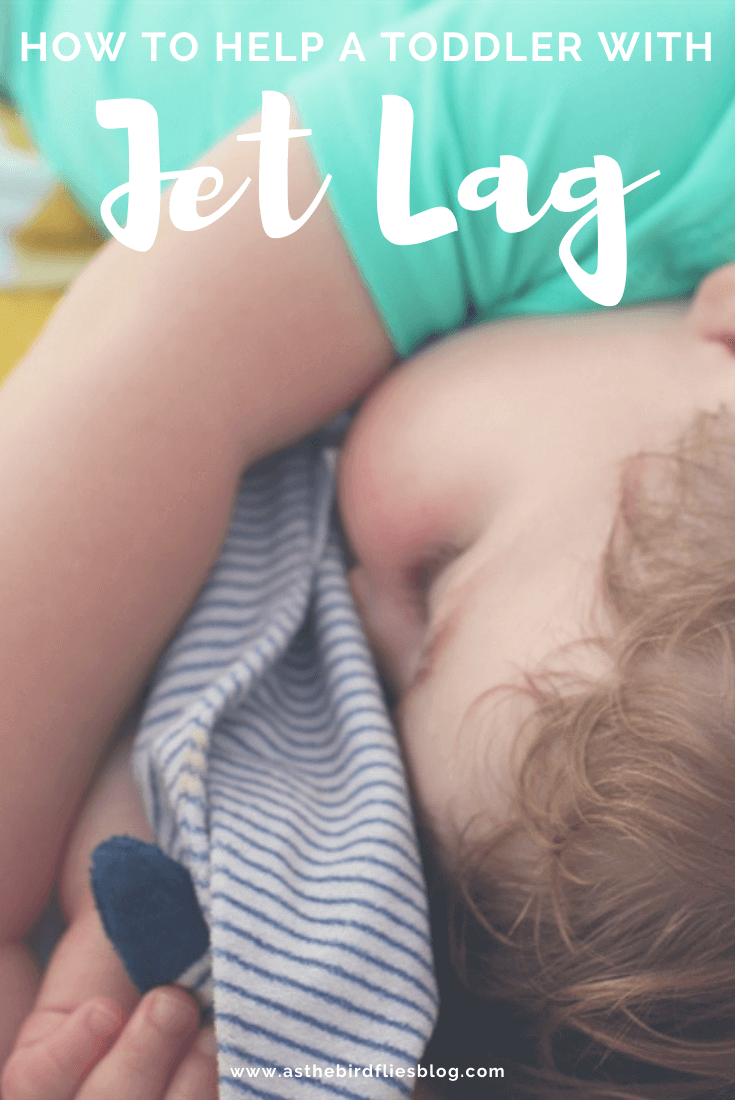
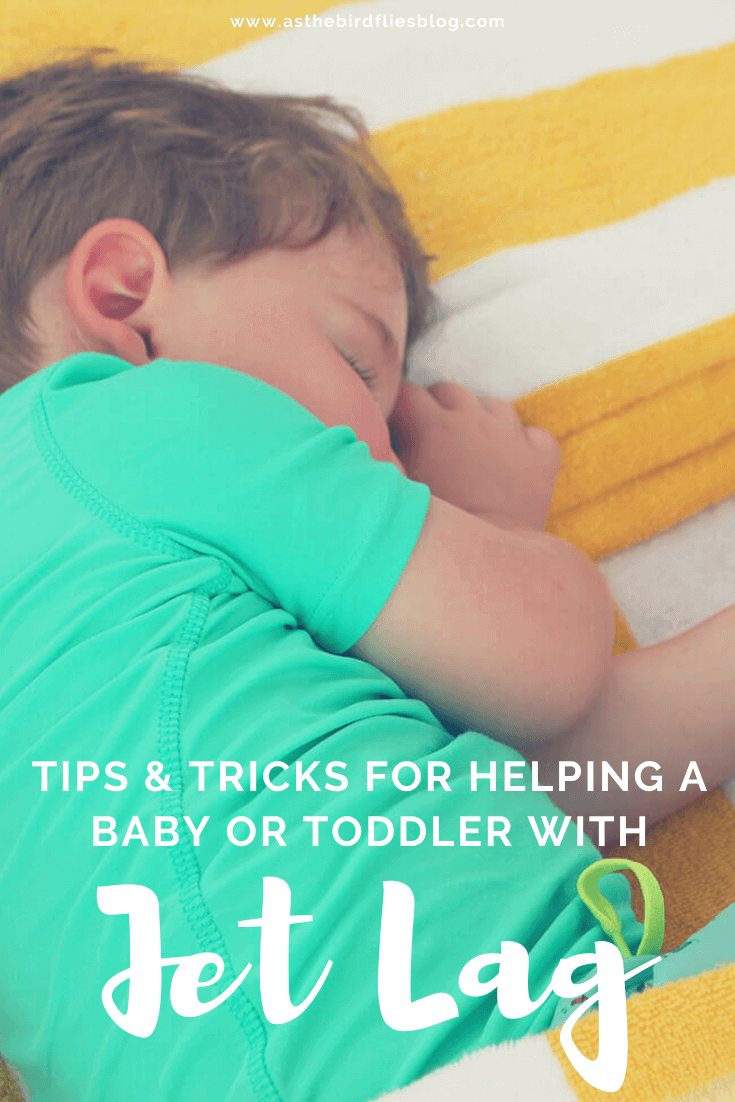
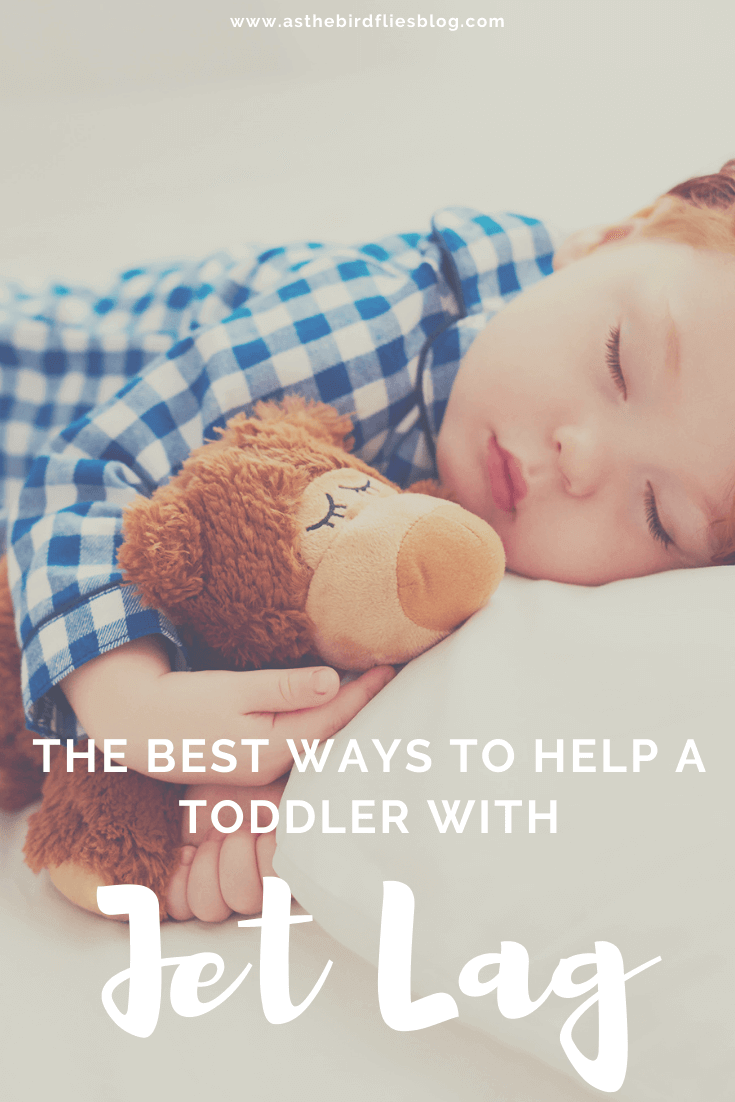
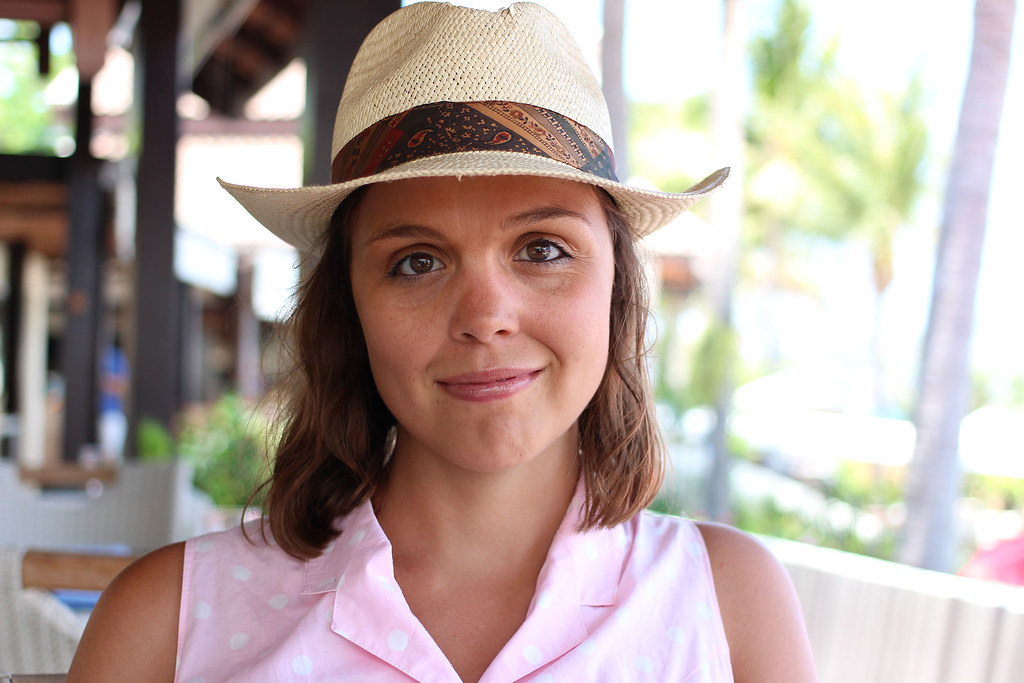
Frances M. Thompson
Londoner turned wanderer, Frankie is an author, freelance writer and blogger. Currently based in Amsterdam, Frankie was nomadic for two years before starting a family with her Australian partner. Frankie is the author of three short story collections, and is a freelance writer for travel and creative brands. In 2017, she launched WriteNOW Cards, affirmation cards for writers that help build a productive and positive writing practice. When not writing contemporary fiction, Frankie shops for vintage clothes, dances to 70s disco music and chases her two young sons around Amsterdam.
Find Frankie on Facebook, Twitter, Instagram, Pinterest, and Google+.
Find Frankie on Facebook, Twitter, Instagram, Pinterest, and Google+.
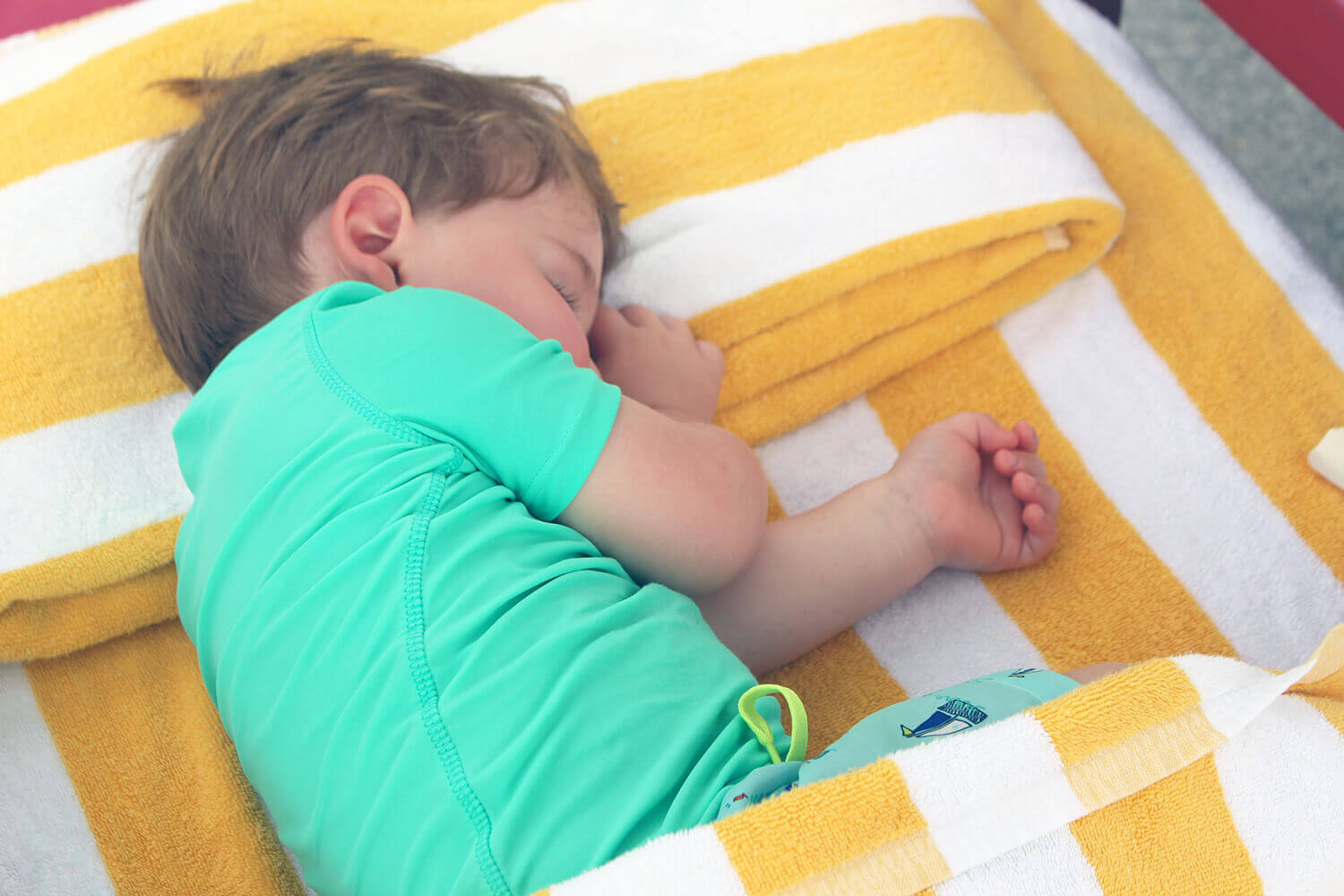
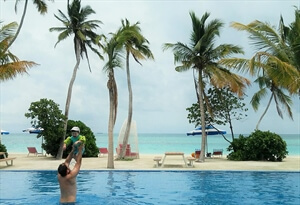 Family Travel: How to Travel with Kids - My Golden Rules
Family Travel: How to Travel with Kids - My Golden Rules_x300.jpg?v=1) Amsterdam Travel: Best Luxury Hotels in Amsterdam - Reviewed!
Amsterdam Travel: Best Luxury Hotels in Amsterdam - Reviewed! Solo Luxury Travel: Best Caribbean Islands for Solo Travellers
Solo Luxury Travel: Best Caribbean Islands for Solo Travellers New Zealand Travel: 51 Interesting Facts About New Zealand Aotearoa
New Zealand Travel: 51 Interesting Facts About New Zealand Aotearoa Amsterdam Travel: Accessible Travel Guide for Amsterdam
Amsterdam Travel: Accessible Travel Guide for Amsterdam About the Blog & Frankie
About the Blog & Frankie Welcome to My Amsterdam Travel Blog!
Welcome to My Amsterdam Travel Blog! Welcome to My Luxury Family Travel Blog!
Welcome to My Luxury Family Travel Blog! Welcome to My Writing Blog!
Welcome to My Writing Blog! Lover Mother Other: Poems - Out Now!
Lover Mother Other: Poems - Out Now! I Write Stories That Move You
I Write Stories That Move You Order WriteNOW Cards - Affirmation Cards for Writers
Order WriteNOW Cards - Affirmation Cards for Writers Work With Me
Work With Me